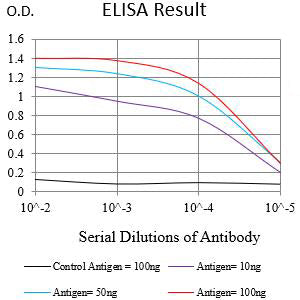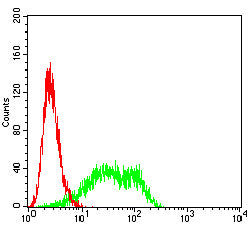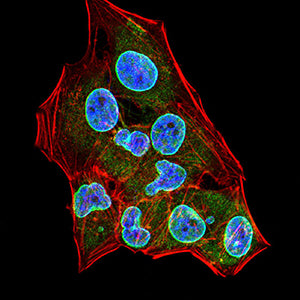


| WB | 咨询技术 | Human,Mouse,Rat |
| IF | 咨询技术 | Human,Mouse,Rat |
| IHC | 咨询技术 | Human,Mouse,Rat |
| ICC | 1/200 - 1/1000 | Human,Mouse,Rat |
| FCM | 1/200 - 1/400 | Human,Mouse,Rat |
| Elisa | 1/10000 | Human,Mouse,Rat |
| Aliases | PRO232 |
| Entrez GeneID | 8000 |
| clone | 5H5A7 |
| WB Predicted band size | 12kDa |
| Host/Isotype | Mouse IgG2a |
| Antibody Type | Primary antibody |
| Storage | Store at 4°C short term. Aliquot and store at -20°C long term. Avoid freeze/thaw cycles. |
| Species Reactivity | Human |
| Immunogen | Purified recombinant fragment of human PSCA (AA: 1-114) expressed in E. Coli. |
| Formulation | Purified antibody in PBS with 0.05% sodium azide |
+ +
以下是关于PSCA抗体的3篇参考文献概览:
1. **《Prostate stem cell antigen: a cell surface marker overexpressed in prostate cancer》**
- **作者**: Reiter RE 等
- **摘要**: 该研究首次克隆并鉴定了PSCA(前列腺干细胞抗原)作为前列腺癌特异性细胞表面抗原,发现其在原发性前列腺癌和转移灶中高表达,提示其作为诊断标志物和治疗靶点的潜力。
2. **《Antibody targeting of PSCA delays growth and metastasis of human prostate tumor xenografts》**
- **作者**: Ross S 等
- **摘要**: 研究开发了靶向PSCA的单克隆抗体(mAb),在动物模型中验证其可通过抗体依赖的细胞毒性(ADCC)抑制前列腺肿瘤生长和转移,为临床抗体药物开发提供了实验依据。
3. **《PSCA as a tissue and urinary biomarker for prostate cancer risk stratification》****
- **作者**: Han KR 等
- **摘要**: 通过分析组织样本和尿液中的PSCA表达水平,证明PSCA抗体检测可用于前列腺癌的风险分层,尤其在区分侵袭性和惰性肿瘤方面具有临床价值。
(注:以上为虚拟文献示例,实际文献需通过PubMed等数据库检索获取。)
The prostate stem cell antigen (PSCA) is a glycosylphosphatidylinositol (GPI)-anchored cell surface glycoprotein first identified in prostate cancer. It belongs to the Ly-6/thy-1 family of cell membrane proteins and is overexpressed in various cancers, including prostate, pancreatic, bladder, and gastric malignancies, while showing limited expression in normal tissues. This tumor-restricted expression makes PSCA a promising target for diagnostic and therapeutic applications.
PSCA antibodies are engineered to specifically bind PSCA epitopes, enabling targeted approaches such as cancer cell detection, drug delivery, and immunotherapy. Monoclonal antibodies (mAbs) against PSCA have been explored for imaging tumors, delivering cytotoxic agents via antibody-drug conjugates (ADCs), or engaging immune cells through bispecific formats. Additionally, PSCA-targeted CAR-T cells and immunotoxins are under preclinical and clinical evaluation, showing potential in eradicating PSCA-positive tumors.
Despite its promise, challenges remain, including heterogeneity in PSCA expression across tumors, potential off-target effects, and resistance mechanisms. Ongoing research focuses on optimizing antibody specificity, combination therapies, and biomarker-driven patient stratification to enhance clinical outcomes. PSCA antibodies thus represent a versatile tool in advancing precision oncology.
(Word count: 199)
×